News from Nancy!

Hello Everyone!
I hope you are
all doing well! I want to start out by saying that due to Wisconsin Statute,
Section 11.1205, this will be the last E-update until after Election Day.
Under s. 11.1205, a Representative who becomes a candidate for office may
not use public funds to distribute 50 or more pieces of substantially
identical material after the first day for circulation of nomination papers,
and that applies to these E-Updates. Now back to the update!
My first term in office was filled with many
big pieces of legislation such as the continuation of the HOPE Agenda—which
tackles the growing problem of heroin and opioid addiction in our state—a
package of bills to help those struggling with dementia and their families,
the
Rural Wisconsin Initiative, and the balancing of our state budget with
no tax increases.
These are great victories for the taxpayers of Wisconsin,
but at times, they overshadowed some great things we did in other areas.
That is why I am including a list of bills I authored or co-authored that
have been signed into law during my first term as your representative. In
addition, I will be including legislation specifically crafted for our
veterans and Wisconsin's agricultural industry.
I’m proud of the many things we accomplished
this past legislative session, and I look forward to continuing that work
and achieving even more in the future. As always, please don’t hesitate to
contact me for any reason.
VanderMeer Legislation Signed
into Law
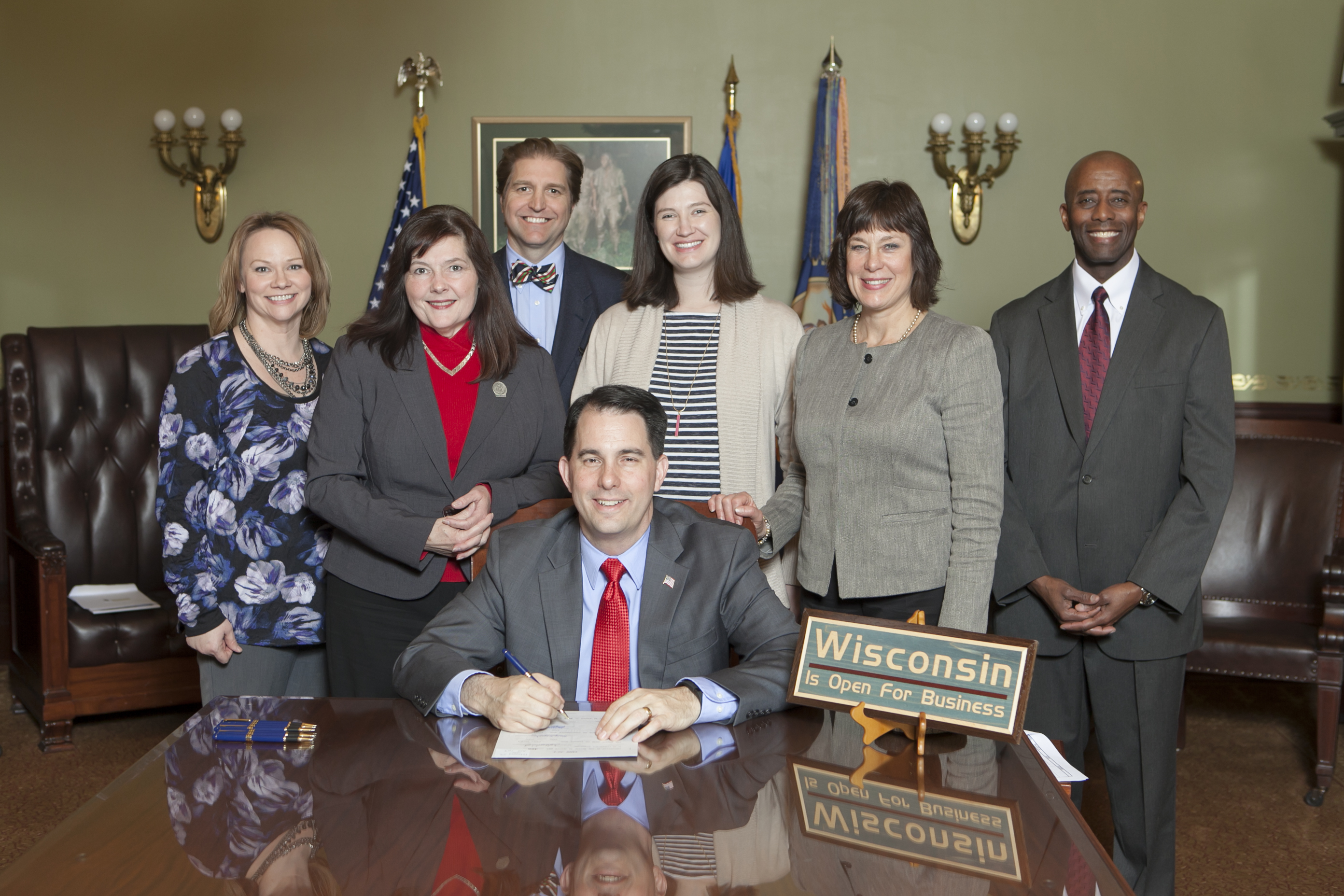
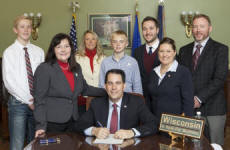
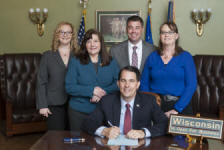
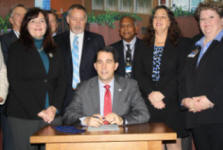
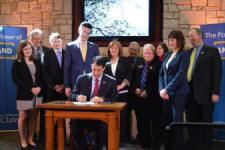

Assembly Bill
253 will enable Wisconsin to enter into an Interstate Medical Licensure
Compact, which will provide a new, expedited, licensing option for
physicians seeking to practice in multiple states. This legislation will
increase access to health care, and help to alleviate the physician shortage
in our state, especially in rural areas like the 70th Assembly District.
Assembly Bill
299, co-authored with Senator Lassa (D-Stevens Point), helps school
districts fill much needed positions by allowing school board members to act
as unpaid volunteer coaches or supervisors of an extracurricular activity in
their school districts.
Assembly Bill
351,
co-authored with Senator Lassa (D-Stevens
Point),
is relating to Wisconsin’s Children First Program, administered by
the Department of Children & Families. This will provide non-custodial
parents who are unemployed or underemployed a pathway for training and
future employability. It is a way to develop our workforce and give more
opportunities for families.
Assembly Bill
541 creates a $500,000 grant program to improve employment outcomes for
veterans by focusing on veteran entrepreneurs, incentives to hire veterans
with a service-connected disability, and job training. (More information
below).
Assembly Bill
609 is relating to libraries and delinquent accounts. Due to privacy
protections, libraries have no means by which to collect from those who are
abusing their borrowing privileges. Since libraries are supported through
tax dollars, the financial loss of unreturned library materials and unpaid
fines ultimately falls on taxpayers and other library users. This
legislation will provide libraries with a method to collect fines and
reimbursement for overdue materials on delinquent library accounts.
Assembly Bill
610 will
allow courts to impose a more fitting penalty for crimes against the elderly
or disabled. Under certain conditions, the bill will allow a court to impose
a supplement forfeiture for certain violation. This will help protect and
shield Wisconsin’s most vulnerable citizens.
Assembly Bill
664 permits licensed treatment professionals to provide mental health services in schools
without establishing a branch office in the school.
Reducing red tape will make it easier for mental health professionals to
provide services at schools. When mental health therapy is available at
school, students are more likely to access treatment and miss less class
time than when they have to travel to an off-site clinic.
Assembly Bill
744 is part of the College Affordability Legislative Package to address
student loan debt and increase the success of college students. This will
require all higher education institutions to send students an annual letter
with information regarding educational costs and financial literacy so
students and families can make better decisions about their financial
future.
Senate Joint
Resolution 45, co-authored with Senator Lassa (D-Stevens Point), proclaims
February 2016 as USO Wisconsin Month to celebrate the organization’s 75th
anniversary and raise awareness of the services it provides for military
members and their families.
Focusing Veterans
My colleagues and I in the legislature worked
hard this session to make some great strides in caring for and supporting
our state’s veterans. As Vice-Chair of the Assembly Committee on Veterans &
Military Affairs, I would like to share some of this session’s highlights
with you.
Allowing
More Veterans to Qualify for the Veterans Employment Grant (Assembly Bill
541)
Currently, Wisconsin operates a Veterans Employment Grant designed to help
bridge the gap between local employees and veterans looking for work.
Unfortunately, the grants in place previously were never used due to
excessive eligibility requirements. This grant is far too important not to
be working properly for veterans of this state and I am proud to have
authored Assembly Bill 541 which will create a new program to better meet
the intent and expected results of the original program. This will ensure
that veterans in our state are able to benefit from these grants.
The Wisconsin Veterans Employment Initiative (Assembly Bill 441)
All too often, hurdles remain in place for veterans returning to civilian
life and in search of a job. I believe that government agencies should be
encouraged to hire qualified veterans because of the positive attributes
they bring to a position due to their military training and experience.
That’s why I’m proud to have supported this bill that creates a program
designed to increase the number of veterans holding permanent state
government positions.
New Grant Program for Services to Veterans and Their Families
(Assembly Bill 542)
It is important to ensure that grant money going to non-profit organizations
truly provide services and resources for veterans that are in need of help.
This bill creates a grant program administered by the Department of Veterans
Affairs (DVA) for this purpose. Under the bill, DVA may make up to a total
of $250,000 in grants to non-profit organizations that provide financial
assistance or other services to veterans and their families. An individual
nonprofit organization may receive up to $25,000 in grants under this
program.
Disposition of the Unclaimed Cremated Remains of Veterans and Their
Dependents (Assembly Bill 693)
Too often cemeteries, funeral homes, and crematoria find themselves in
custody of unclaimed remains. This bill ensures that veterans who were
honorably discharged get the recognition they deserve and receive the proper
burial honors. The remains of veterans deserve to be taken care of with the
utmost respect, and this bill gives us the chance to show our gratitude for
those who served our country by making sure they receive an honorable
burial.
Designates Logos for Veteran and Disabled Veteran Owned Business
(Assembly Bill 707)
Similar to the “Made in Wisconsin” stickers you may find on many products,
this bill provides a standardized tool for veteran-owned and disabled
veteran-owned businesses to market themselves as such in their respective
communities and throughout the State. These businesses would also be more
accessible and identifiable to consumers who wish to support veteran-owned
businesses.
The 2015-2016 State Budget Achievements (Wisconsin Act 55)
The state budget also included a number of positive developments for
Veterans. The budget helped ensure veterans returning to higher education at
technical colleges are better equipped for the transition. To assist this,
$1 million was allocated to the Wisconsin Technical College System to
develop and expand specialized instruction and support services for veterans
enrolled in their programs. It also added a credit to the performance
measures for the Wisconsin Technical College System for those veterans who
have military training.
Wisconsin’s Annual Average Veteran Unemployment Rate Declines to 3.6%
in 2015
Wisconsin’s 2015 unemployment rate for military veterans declined to 3.6
percent and tied for 14th lowest in the country, according to data published
by U.S. Bureau of Labor Statistics (BLS). The annual average unemployment
rate for all veterans 18 years of age and older was a full percentage point
below the national rate of 4.6 percent, according to the BLS report.
In two years, Wisconsin's annual average unemployment rate for veterans has
fallen by more than half, from 7.6% to the current 3.6%. In addition, the
state's veteran unemployment rate for veterans 18 years of age and older
declined every year since 2011. I have been committed to helping those
who have courageously served our country apply their tremendous skills and
abilities toward family-supporting jobs when they return home.
I want to thank all of you who have served this great country and the
sacrifices you and your families have made. I am proud of the work the
Wisconsin State Assembly has done to help ensure that the veterans in our
state receive the care and respect they rightfully deserve.
Focusing on Agriculture
I want to take the time to thank you
everyone involved in Wisconsin’s agricultural industry for their hard work
and service. My husband, Dave Hall, is a 5th generation dairy farmer so I
know how hard all of you work. Because of your hard work, our state’s
agriculture industry contributes $88 billion annually to the state economy,
and provides nearly 12 percent of the total jobs in our state. As a member
of the Assembly Committee on Agriculture, I wanted to share with you some of
the proposals that I have proudly supported that help keep our agriculture
industry strong.
You’ll be happy to know that the current state budget preserves key
agricultural provisions such as the retention of Department of Agriculture,
Trade and Consumer Protection (DATCP) and Department of Natural Resources (DNR)
boards as citizen boards, and the continuation of the Center for Co-ops. The
budget also included funding for Discovery Farms and allowed the Fertilizer
Research Council to be supported by industry fees. These programs have been
critical in helping our state remain a national leader in agriculture.
Key legislative highlights from this session include modernizing state meat
and poultry inspection (Act 243) and food and dairy processing plant
licenses (Act 242). We also updated the state’s commercial feed penalty
provisions (Act 244). In addition, I supported the passage of Act 235, which
extends the seasonal weight exceptions for harvest crop transport – now
taking into account that crops are often harvested earlier in the season
than ever before.
The Assembly updated state law for several agricultural loan guarantee
programs administered by the Wisconsin Housing and Economic Development
Authority (WHEDA), such as extending the Agricultural Production Drought
Assistance Loan Guarantee Program, increasing loan amounts to reflect
current market conditions, and preserving family farms by giving WHEDA the
flexibility to waive an origination fee for a Farm Assets Reinvestment
Management (FARM) loan.
Moving forward, there are a number of priorities that will need continued
work next session. One such proposal is the Implements of Husbandry (IoH)
package, addressing issues related to increasingly large and heavy farm
equipment operating on Wisconsin roadways. Because of the ever-changing
industry needs and the season-by-season importance, it’s essential that this
package of proposals meets the expectations of our farming communities.
I was proud to support these agricultural priorities this session because I
want to do all that I can to support one of Wisconsin’s most vital
industries. Not only is agriculture an essential economic engine, but it is
also a part of our identity as a state. Its importance cannot be
underestimated, and neither can the hard work and dedication that is needed
to successfully operate an agricultural business.
Sincerely,

|

